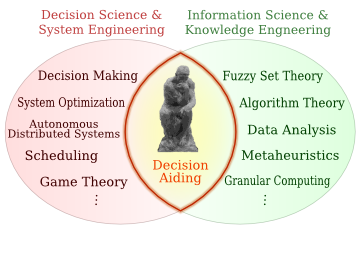The Goals of Our Research

Our laboratory aims to develop conventional decision sciences and systematic methods as well as intelligent decision aid technologies based on information science and intelligence engineering. We study fundamental theory such as decision making, mathematical programming, fuzzy set theory, computational theory and algorithm theory. Moreover, we exploit those for new decision making methods, modeling, optimization methods, data analysis, quick algorithms, soft computing, and so on.
Fuzzy Optimization and Decision Making
In the real world, we are often faced with problems under uncertainty. The uncertainty cannot be always treated well by the probability theory. We study fuzzy set theory, possibility theory and evidence theory in order to treat various kinds of uncertainty. We apply those theories to optimization and decision making problems under uncertainty and develop new decision making techniques.
Rough Sets as a Tool for Decision Support
Objects are often expressed by combinations of their characters. For example, apples may be expressed as "round and red fruits". Such expressions yield the indiscernibility between objects. Rough set theory provides methods of information analysis based on the indiscernibility. Methods for attribute reduction, rule extraction, etc. have been proposed. We study decision support techniques using rough set analysis. Moreover, we generalize the rough sets to make a proper analysis under various problem setting. Through those studies, we explore the essence of rough set analysis.
Combinatorial Optimization and Discrete Algorithms
A number of real-life problems can be formulated as combinatorial optimization, and hence combinatorial optimization has its roots in combinatorics, operations research and computer science. Our main research is concerned with the design and analysis of algorithms for fundamental problems in combinatorial optimization.
Cooperative Game Theory
Game theory is a well-known useful mathematical theory to describe and analyse decision system with multiple decision makers. We are interested especially in cooperative game theory, which is used when there is a possibility of cooperation among decision makers. It can be applied to social systems, management systems, and so on.
